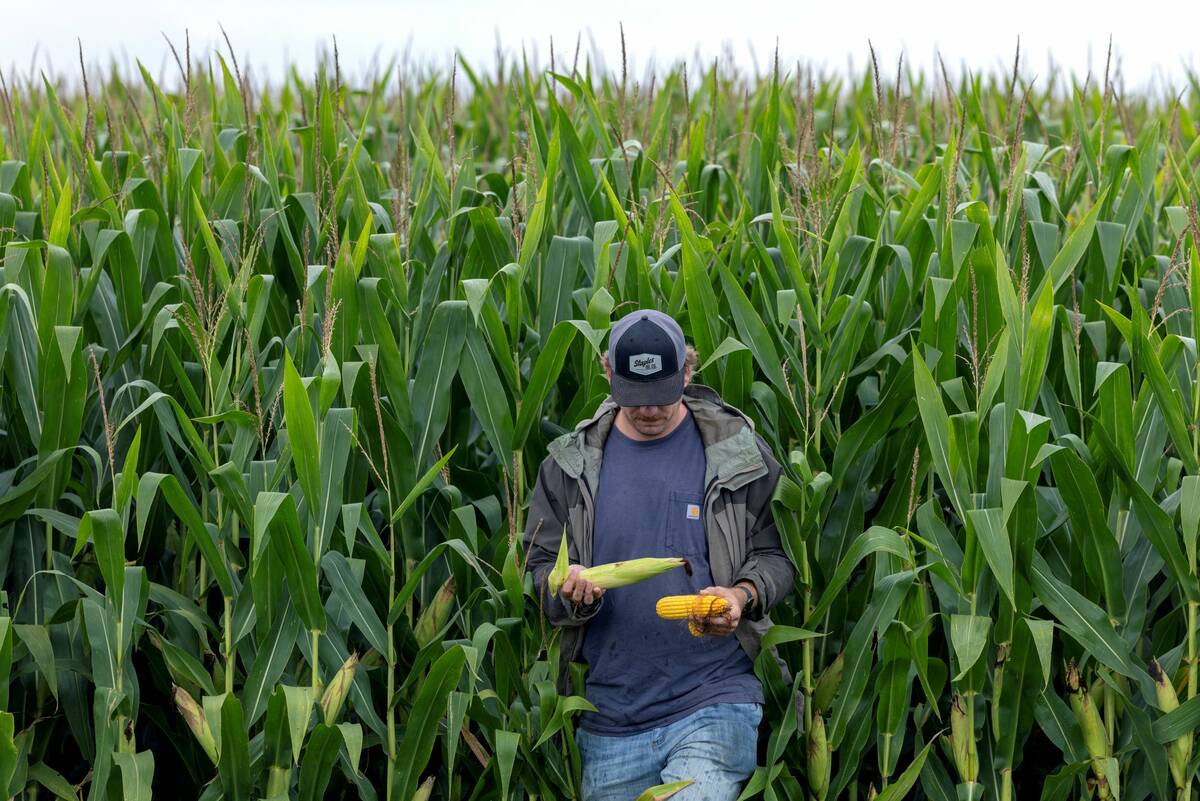Oct. 20 — A somewhat traditional “turnaround Tuesday,” with profit-taking the main focus of the markets after yesterday’s solid gains.
Financial markets, energy and grains all ended lower on the day, with the exception of canola which finished higher primarily due to the two-cent drop in the Canadian dollar, which sparked some new export activity.
The U.S. dollar was up marginally today; the Canadian dollar closed at US95.19 cents.
The Dow Jones December quote closed down 41 points to close at 10,000 today.
Read Also

The U.S. corn crop could be the biggest ever. That’s terrible news for America’s farmers.
The USDA predicts a record corn crop for U.S. farmers, who question the agency’s accuracy amidst high debt and low crop prices.
Crude oil closed down 52 cents a barrel today at US$79.09.
Corn closed down one to two cents a bushel today, while beans closed down 13-17 cents a bushel.
Wheat futures were unchanged to down 6.2 cents a bushel today. Minneapolis December wheat closed down 6.2 cents a bushel for the day.
Canola closed up $2.50-$5.70 per tonne today.
November Western barley futures closed up $1 at $154 per tonne.
World markets are changing everyday and we (Canada) as a major exporting country need to adjust to this reality sooner than later or we will continue to see a downward spiral in our agriculture sector.
The world population is expected to grow exponentially over the next 20 years and the talk is that the world cannot produce enough food to supply the need — which, you would think, should be good for agriculture in Canada. The concern I have is that most of the countries where the planned population growth is to occur cannot afford to buy enough grain to feed their people, or they will not buy the higher-quality higher-cost grains that we grow in Canada.
Major importing countries are putting plans in place to increase their production either through better genetics and farming practices or by leasing land on other continents to produce grains for their own consumption. They are doing this in an effort to try to feed their population as it grows, which should be a major concern for an exporting country such as Canada, which has relied on many of these markets for years.
Another example of this is Egypt, the world’s largest wheat importer, which has announced it plans to be 75 per cent self-sufficient in wheat in the next 10 years. It is currently 55 per cent self-sufficient. This will mean a loss of large tonnage in a major market, which will certainly have an impact on Canada.
If we in Canada cannot reduce our costs of production or our cost to handle and ship grain to our customers in order to compete against some of the future grain exporting superpowers such as South America and/or the former Soviet Union, we are going to find ourselves sitting on a lot of high-cost grain with nowhere to sell it.
Increased yields through genetics can certainly help to reduce the cost of production to some extent, but not enough to keep us competitive in the future world marketplace.
We need to take a serious look at whether or not the world export market is a market we want to continue to compete in as we do today, or if there are other crops and products we should be producing that can be used at home for our benefit and that may help to revitalize some secondary industries within the agriculture sector that helped built this country in the first place. Food for thought!
That’s all for today. — Brian
— Brian Wittal has spent over 27 years in the grain industry, including as an elevator manager and producer services representative for Alberta Wheat Pool, a regional sales manager for AgPro Grain and farm business representative for the Canadian Wheat Board, where he helped design some of the new pricing programs. He also operates his own company providing marketing and risk management advice for Prairie grain producers. Brian’s daily commentaries focus on how domestic and world market conditions affect you directly as grain producers.
Brian welcomes feedback and information on market conditions in your area, such as current offering prices, basis levels, trucking premiums and special crops contracts. Contact Brian today.











